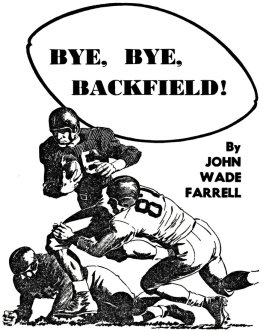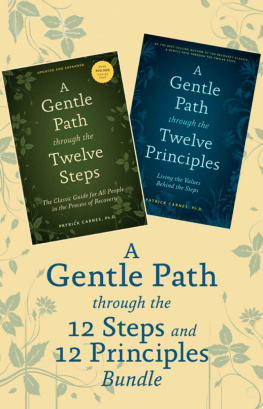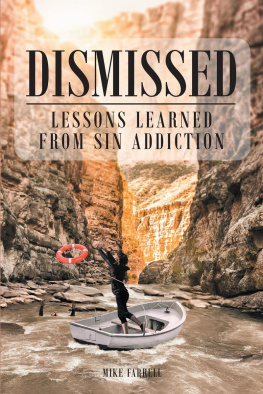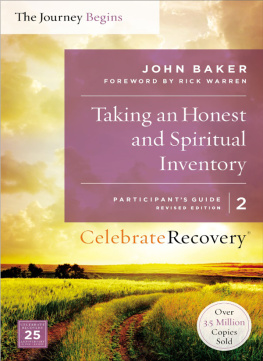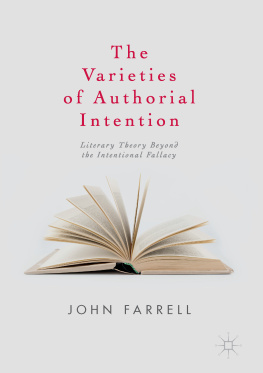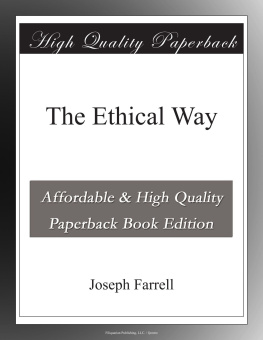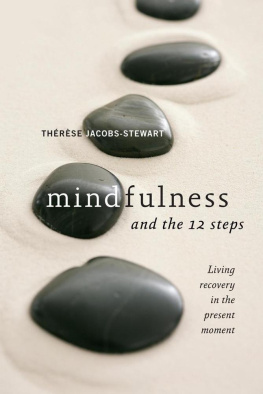

Central Recovery Press (CRP) is committed to publishing exceptional materials addressing addiction treatment, recovery, and behavioral healthcare topics, including original and quality books, audio/visual communications, and web-based new media. Through a diverse selection of titles, we seek to contribute a broad range of unique resources for professionals, recovering individuals and their families, and the general public.
For more information, visit www.centralrecoverypress.com.
2013 by Central Recovery Press
All rights reserved. Published 2013.
No part of this publication may be reproduced, stored in a retrieval system, or transmitted in any form or by any means, electronic, mechanical, photocopying, recording, or otherwise, without the written permission of the publisher.
Publisher: Central Recovery Press
3321 N. Buffalo Drive
Las Vegas, NV 89129
18 17 16 15 14 13 1 2 3 4 5
ISBN: 978-1-937612-34-4 (e-book)
Cover and interior design by Marisa Jackson.
Author photo by Olan Mills. Used with permission. All rights reserved.
To Tom, Jack, and Dan
MY THREE SPONSORS
OVER THE DECADES
TABLE OF CONTENTS
I Am Worthy: A Prayer for All Those in Recovery
REV. JOHN T. FARRELL
I am worthy of recovery, serenity, and a happy life. I am worthy of achieving these things, no matter what I have done up to this point in life and whatever transgressions I may have committed. I am still worthy.
I am competent and intelligent, no matter how badly I did in school and what my employment history is. I can make a contribution, no matter what anyone has told me to the contrary. I alone have the means to reach my dreams. I am worthy to live my dreams.
The road of life is difficult, not just for me, but for everyone. It does me no good to compare myself to others. All are worthy in the eyes of God and all face unique challenges. I shall be honest about who I am and will move away from my preoccupation with self. It is not humility to be something I am not or what others expect me to be. I will be myself because I am worthy.
No one will give me my new life of recovery. I am willing to work hard for it. I am willing to accept the gifts and tools I have been given. I am willing to transform myself into the good and worthy person I was meant to be. I am willing to pray and to serve others. I will always remember that I am worthy. And I will always be grateful.
From Guide Me in My Recovery: Prayers for Times of Joy and Times of Trial by The Reverend John T. Farrell, PhD. 2010 Central Recovery Press.
I n the world of twelve-step recovery the Eleventh and Twelfth Steps focus on continuing a spiritual life of growth and action for people. They are urged to pray and to meditate. It is assumed that they have experienced a spiritual awakening and have acquired a set of spiritual principles that will guide them in their daily conduct. The dilemma for many people is that while they may have become adept at recovery and living the Twelve Steps, they received little or no guidance in the practical management of their spiritual lives. The purpose of this book is to provide a set of spiritual practices that will appeal to people in recovery as they set out to improve their conscious contact with God as they understand God and to practice the principles of recovery in all their affairs.
Much has been written on the subject of meditation and even more on the topic of prayer for people in recovery. Lists of so-called recovery spiritual principles are bountiful. But little has been written on the subject of spiritual practices that will assist ones recovery. By spiritual practices, also known as spiritual discipline, I mean the consistent performance of actions and activities undertaken for the purpose of cultivating or developing spiritual growth.
This book provides an introduction to various spiritual disciplines that will assist people not just in working the Eleventh and Twelfth Steps, but in helping them develop a set of spiritual practices that they can use in their daily lives and recovery. Although anyone seeking a spiritual life may find this book useful, it is primarily directed toward men and women in twelve-step recovery programs who wish to enhance and deepen their spiritual lives as Step Eleven directs: We sought through prayer and meditation to improve our conscious contact with God as we understood Him, praying only for knowledge of His will for us and the power to carry that out.
Spiritual practices are exactly what the name suggests: they are intentional methods to better our understanding about matters of the soul and to assist us on the path to the spiritual growth crucial to long-term recovery. Spiritual practices are tools for becoming aware of the divine spark of goodness dwelling within us all. At their best, these practices stimulate our consciousness with aspirations and visions that transcend the mundane and negative in our lives. In applying spiritual practices, we will find that lines can be blurred between what is considered spiritual and what is material.
Most of us resist the idea of spiritual transformation when we first encounter a program of recovery. I know I did. To live a spiritual life was very different from the life that I had learned and practiced until the moment of my recovery. I was frightened and skeptical. As part of their resistance, most addicts will find all sorts of reasons to divert and distract themselves from the Twelve Steps, especially Step Eleven. But somehow Gods will prevails and we overcome our resistance. Our persistence and patience are the means of grace given to us by God, as we strive to create and maintain a conscious contact with our Higher Power.
In finding the path to spiritual transformation, twelve-step programs make clear distinctions between religion and spirituality. Religion is regarded as being laden with theology, doctrine, and worship. Spirituality is perceived as something clearer, purer, and, well, more spiritual. Many of the people I know in recovery describe themselves as spiritual, but not religious (for brevitys sakes, Ill use SBNR). And certainly, some of the most faithful, integrated, and compassionate people I know are SBNR.
But the line between religion and spirituality is not always clear-cut. For instance, the common assumption that SBNR individuals operate outside the world of organized religion is not correct. One recent researcher claims that many of the people who regularly or irregularly show up at American churches and synagogues apply the SBNR label to themselves. Scratch below the surface of an average worship service, she says, and you will find many who resonate with this description. They may attend church on Sunday, but during the week pursue meditation, new and alternative spiritualities, wellness programs, and competing claims of ancient wisdom. Oftentimes, clergy themselves are among them. These SBNR people often say their various pursuits are a useful adjunct to traditional religious practices. Conversely, they claim traditional religious practices are a useful adjunct to more contemporary or alternative methods. In fact, it might be more accurate to refer to the SBNR population as seekers, since it seems that their purpose is to connect with that which is greater than themselvesthat which is considered divine.
Next page


